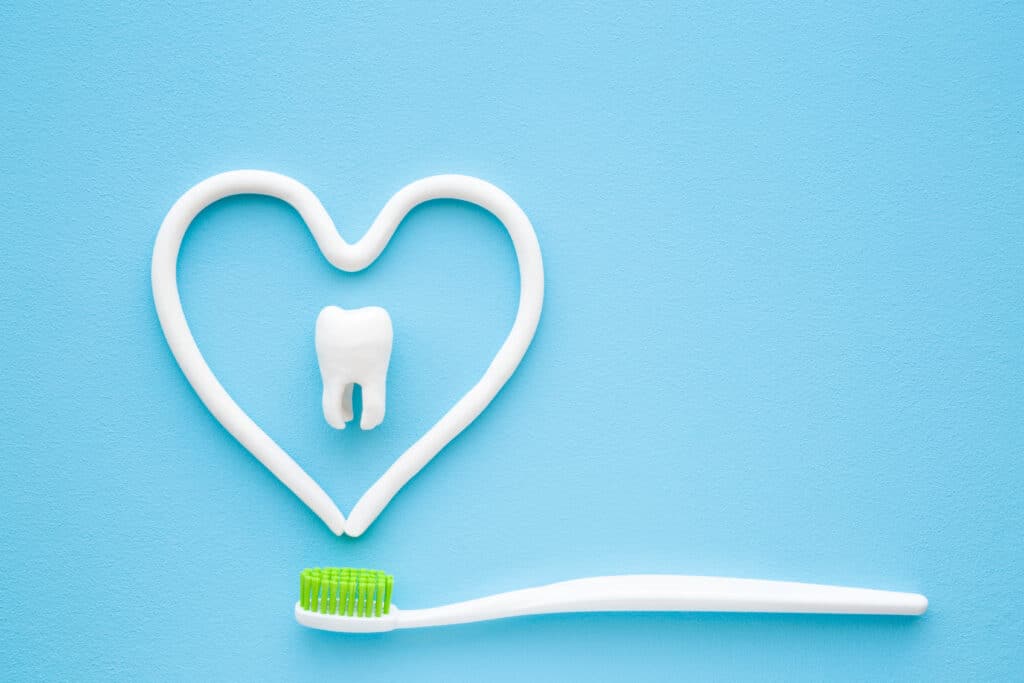The use of fluoride in toothpaste is not for everyone, and that’s where hydroxyapatite toothpaste comes in as a great alternative. As a fluoride-free toothpaste, hydroxyapatite (HA or HAP) is primarily composed of calcium, which makes up the majority of your tooth enamel and dentin. So, for anyone looking for a more natural preventative and cavity repair toothpaste, this product should be your top pick! In this blog, we will dive into what hydroxyapatite and fluoride are, their pros and cons, and how to use hydroxyapatite toothpaste.
Before going into all the benefits, let’s first go over exactly what hydroxyapatite is. Hydroxyapatite is a naturally occurring mineral found in your bones and teeth. It is a form of calcium apatite, which is what gives your teeth their natural strength. The mineral gets broken down and made into a toothpaste that provides a natural and safe alternative to fluoride toothpaste.
Hydroxyapatite Toothpaste VS Fluoride
As you may know, fluoride is in a lot of items related to your dental health, including toothpaste. It has been the overall industry standard in the dental community for decades. Although it still is for many practices, hydroxyapatite is taking over as a newer ingredient for better dental health. To help you decide between hydroxyapatite toothpaste vs fluoride toothpaste, we will go over how they both work.
Fluoride is a type of mineral that helps strengthen tooth enamel while also helping to prevent cavities from forming. The way it does this is by increasing the water content in your saliva, which coats your teeth and is a natural way to remove food debris from your teeth and also wash away any bacteria that can often lead to tooth decay or gum disease.
Hydroxyapatite toothpaste, on the other hand, is made up of calcium and phosphate, elements that already make up your teeth. This allows your teeth to absorb calcium, and from there, it fills in any enamel fissures. Hydroxyapatite naturally helps by replacing any dissolved minerals that were previously lost from your teeth. This strengthens your teeth, helping to fight against plaque, which is the most common source of tooth decay and gum disease. Overall, hydroxyapatite and fluoride toothpaste both work to help fight cavities, but in different ways.
Is Hydroxyapatite Better Than Fluoride?
As we’ve seen, both hydroxyapatite and fluoride are effective in cavity repair toothpaste, but each has its pros and cons. Let’s discuss hydroxyapatite toothpaste first:
Pros:
- It can help prevent and heal cavities through remineralizing, which helps repair and strengthen your enamel.
- It helps teeth become more resistant to acidic pH, which is found in your mouth and normally breaks down enamel quicker.
- The body recognizes the elements it is made up of as something that it needs, making it biocompatible and non-toxic.
Cons
- There is a very rare chance that you can be allergic to it.
Next, let’s move to the pros and cons of fluoride toothpaste:
Pros:
- Can restore minerals on the surface of your teeth.
- It has the ability to reverse signs of tooth decay, while also helping to prevent any growth of harmful bacteria in your mouth.
- Strengthens your tooth enamel, which helps protect your teeth from cavities.
Cons
- It can cause dental fluorosis, which leads to pitted and discolored teeth, or white streaks on your teeth.
- It can be potentially toxic if you consume a very large amount.
Knowing the pros and cons for both helps you understand the ingredients of your toothpaste.
Is Calcium Hydroxyapatite Safe in Toothpaste?
Now that you know the benefits and disadvantages of using hydroxyapatite toothpaste, we can confidently say that it is safe to use. Being made of a biocompatible mineral compound, which closely resembles the hydroxyapatite that you can already find in both your teeth and bones, allows your body to recognize it and accept it easily.
The simplest way to use hydroxyapatite toothpaste is by substituting it for your regular daily toothpaste and using it the same way, or according to the package instructions or your dentist’s advice. Just be sure if you ever feel like you’re experiencing any adverse reactions, to speak with your dentist.
To recap, we have gone over the differences between hydroxyapatite and fluoride as a cavity repair toothpaste, what exactly each of them are made up of, the pros and cons of both, and how you should use hydroxyapatite toothpaste. You now have an alternative to fluoride toothpaste to consider using in your daily dental routine. At Inspire Dental Wellness, we can help by going over any questions you may still have about proper oral health care for yourself or for your kids. Both Dr. Erica and Dr. Badia are experienced dentists in the Orland Park area, providing a complete range of dental care. Call today or fill out our contact form to get your next appointment scheduled!

